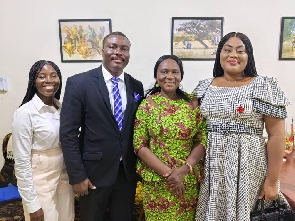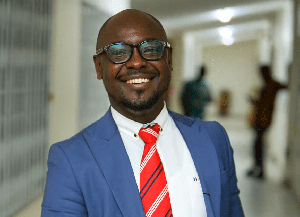Cultural heritage, including traditions, languages, art, and customs, is a vital part of our national identity, connecting us to our roots and maintaining a sense of belonging and pride in our heritage. The promotion of cultural heritage enriches societies, boosts economies, and strengthens cultural connections across the world.
In light of this, the Editorial Board of the Ghana School of Law (GSL) has entered a partnership with the National Folklore Board to use Ghana’s esteemed Adinkra symbols in the design of its latest online journal to contribute to promoting Ghana’s cultural heritage. GSL believes that transmitting culture through content management, literature, and publishing is a powerful means of preserving, sharing, and celebrating a society's cultural heritage.
Ghana, on January 20 2016 ratified the UNESCO Convention for the Safeguarding of Intangible Cultural Heritage (ICH) which requires States that ratify to put in place measures to look after the ICH present on their territories and prevent their disappearance or theft. The 2003 UNESCO Convention for Safeguarding Intangible Cultural Heritage (ICH) is a multilateral platform to protect and raise the profile of cultural heritage. Ratified States are invited to nominate elements to the List of Intangible Cultural Heritage in need of Urgent Safeguarding.
Further, The Representative List of Intangible Cultural Heritage of Humanities as well as the Register of Best Safeguarding Practices, are all mechanisms to focus International attention on ICH elements. The convention also makes provision for ratified states to obtain assistance for ICH safeguarding measures through the Intangible Cultural Heritage Fund.
In view of this, Ghana is however yet to qualify to place its cultural heritage on the world register while countries like Nigeria, Algeria and other African nations have taken the lead. The concern of the National Folklore Board is that due to certain similarities in African cultural elements such as the “Kente” cloth and “Highlife” music, Ghana may lose ownership rights to others.
At a recent brief meeting between the GSL’s Editorial Board and the National Folklore Board, the Executive Director, Mrs. Bernice Ann Deh-Kumah lamented that Ghana receives no compensation for the use of its intangible cultural heritage. She added that Ghana is yet to have rights to its intangible cultural heritage such as Kente after ratifying the convention 20 years ago.
“It is only this year (2023) that Ghana submitted an application to UNESCO seeking ownership rights for Kente. Hopefully with UNESCO’s approval, Ghana can claim ownership by the year 2024.
Mrs Deh-Kumah expressed gratitude for the partnership and called for continuous support by all Ghanaians.
The Editor-in-Chief of Ghana’s School of Law’s editorial board Joyann Obeng said the agreement to use the Adinkra symbols in the publication of scholarly legal articles will help create more awareness.
“These are matters of intellectual property and generally I think the awareness is a bit low so through this channel people will become more aware…I think it’s a step in the right direction.”
A member of the GSL editorial board, Julius Patamia also called on the Folklore Board to escalate to parliament the challenges associated with the non-ownership of our cultural elements as Ghana races against time to codify and protect its cultural heritage.
In a nutshell, The Ghana School of Law together with the National Folklore Board aims to collaborate effectively to ensure the protection, preservation and promotion of Ghana’s rich Intangible Cultural Heritage.
General News of Sunday, 24 September 2023
Source: Ghana School of Law Editorial Board













